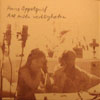Hans Appelqvist, "Att Möta Verkligheten"
Häpna
 Completely out of the blue comes an extraordinary little CD, sopowerful in its minute way, hugely evocative and humane. The clues towhat's going on are in the photos—a living room recording set up withMr. Appelqvist marshalling apparently amateur singers. He plays thepiano and a few other things, talks to the singers and they sing. It isthe intimacy of it that is most compelling, so intense that it isalmost unbearable but beautiful and joyous in such an honest and directway that is truly unique. Only a few of the Songs in the Key of Zcome close and none have this fragility or fluidity. Zenna and Marieare the two little girls on the first track, they sing a song inSwedish chat and then "Be What You Wanna Be" in English. They don'tseem to know all the words, loose their way, mumble some lines but nomatter—they come back to the chorus with enthusiasm and unaffectedpositivity that only the Langly Schools Music Project can touch.Appelqvist's lively playing is deft and idiosyncratic with a delightfullight touch that adds much musicality without moving beyond the role ofaccompaniment. The directness and total absence of artifice carriesover to the sound quality, which is simply brilliant. It puts you rightthere in that mundane living room with these wonderful people topositively eerie effect, as though you were invading someone's privacy.Xiang, more grown up and probably Chinese, sings on track two. Sheexpresses the self-consciousness that comes after childhood and beforeactual maturity. Ruth, older again, is soloist on track three. Hersong, "Geh aus, mein Herz," is given a strangely menacing backdrop witha few heavy guitar chords and ethereal flutes. She sings with theconfidence of someone who has been through motherhood and long sincesent her children off into the world. She seems to treat Appelqvist'sproject with the indulgence she would give to her grandchildren'santics. One could perhaps say that this disk is about language, how itaffects music, how song, intonation and melody adapt to it. The girlssound so different in English from Swedish, Xiang shows that the melodyof Chinese is inescapable, and Ruth's song in German shows thestrictness of that language and how uncomfortable it is with melody.Interesting as this thought may be, the real stuff here is in theemotion and how we lose so much of that with all the manufacturinginvolved in the other music we hear.
Completely out of the blue comes an extraordinary little CD, sopowerful in its minute way, hugely evocative and humane. The clues towhat's going on are in the photos—a living room recording set up withMr. Appelqvist marshalling apparently amateur singers. He plays thepiano and a few other things, talks to the singers and they sing. It isthe intimacy of it that is most compelling, so intense that it isalmost unbearable but beautiful and joyous in such an honest and directway that is truly unique. Only a few of the Songs in the Key of Zcome close and none have this fragility or fluidity. Zenna and Marieare the two little girls on the first track, they sing a song inSwedish chat and then "Be What You Wanna Be" in English. They don'tseem to know all the words, loose their way, mumble some lines but nomatter—they come back to the chorus with enthusiasm and unaffectedpositivity that only the Langly Schools Music Project can touch.Appelqvist's lively playing is deft and idiosyncratic with a delightfullight touch that adds much musicality without moving beyond the role ofaccompaniment. The directness and total absence of artifice carriesover to the sound quality, which is simply brilliant. It puts you rightthere in that mundane living room with these wonderful people topositively eerie effect, as though you were invading someone's privacy.Xiang, more grown up and probably Chinese, sings on track two. Sheexpresses the self-consciousness that comes after childhood and beforeactual maturity. Ruth, older again, is soloist on track three. Hersong, "Geh aus, mein Herz," is given a strangely menacing backdrop witha few heavy guitar chords and ethereal flutes. She sings with theconfidence of someone who has been through motherhood and long sincesent her children off into the world. She seems to treat Appelqvist'sproject with the indulgence she would give to her grandchildren'santics. One could perhaps say that this disk is about language, how itaffects music, how song, intonation and melody adapt to it. The girlssound so different in English from Swedish, Xiang shows that the melodyof Chinese is inescapable, and Ruth's song in German shows thestrictness of that language and how uncomfortable it is with melody.Interesting as this thought may be, the real stuff here is in theemotion and how we lose so much of that with all the manufacturinginvolved in the other music we hear.
 Completely out of the blue comes an extraordinary little CD, sopowerful in its minute way, hugely evocative and humane. The clues towhat's going on are in the photos—a living room recording set up withMr. Appelqvist marshalling apparently amateur singers. He plays thepiano and a few other things, talks to the singers and they sing. It isthe intimacy of it that is most compelling, so intense that it isalmost unbearable but beautiful and joyous in such an honest and directway that is truly unique. Only a few of the Songs in the Key of Zcome close and none have this fragility or fluidity. Zenna and Marieare the two little girls on the first track, they sing a song inSwedish chat and then "Be What You Wanna Be" in English. They don'tseem to know all the words, loose their way, mumble some lines but nomatter—they come back to the chorus with enthusiasm and unaffectedpositivity that only the Langly Schools Music Project can touch.Appelqvist's lively playing is deft and idiosyncratic with a delightfullight touch that adds much musicality without moving beyond the role ofaccompaniment. The directness and total absence of artifice carriesover to the sound quality, which is simply brilliant. It puts you rightthere in that mundane living room with these wonderful people topositively eerie effect, as though you were invading someone's privacy.Xiang, more grown up and probably Chinese, sings on track two. Sheexpresses the self-consciousness that comes after childhood and beforeactual maturity. Ruth, older again, is soloist on track three. Hersong, "Geh aus, mein Herz," is given a strangely menacing backdrop witha few heavy guitar chords and ethereal flutes. She sings with theconfidence of someone who has been through motherhood and long sincesent her children off into the world. She seems to treat Appelqvist'sproject with the indulgence she would give to her grandchildren'santics. One could perhaps say that this disk is about language, how itaffects music, how song, intonation and melody adapt to it. The girlssound so different in English from Swedish, Xiang shows that the melodyof Chinese is inescapable, and Ruth's song in German shows thestrictness of that language and how uncomfortable it is with melody.Interesting as this thought may be, the real stuff here is in theemotion and how we lose so much of that with all the manufacturinginvolved in the other music we hear.
Completely out of the blue comes an extraordinary little CD, sopowerful in its minute way, hugely evocative and humane. The clues towhat's going on are in the photos—a living room recording set up withMr. Appelqvist marshalling apparently amateur singers. He plays thepiano and a few other things, talks to the singers and they sing. It isthe intimacy of it that is most compelling, so intense that it isalmost unbearable but beautiful and joyous in such an honest and directway that is truly unique. Only a few of the Songs in the Key of Zcome close and none have this fragility or fluidity. Zenna and Marieare the two little girls on the first track, they sing a song inSwedish chat and then "Be What You Wanna Be" in English. They don'tseem to know all the words, loose their way, mumble some lines but nomatter—they come back to the chorus with enthusiasm and unaffectedpositivity that only the Langly Schools Music Project can touch.Appelqvist's lively playing is deft and idiosyncratic with a delightfullight touch that adds much musicality without moving beyond the role ofaccompaniment. The directness and total absence of artifice carriesover to the sound quality, which is simply brilliant. It puts you rightthere in that mundane living room with these wonderful people topositively eerie effect, as though you were invading someone's privacy.Xiang, more grown up and probably Chinese, sings on track two. Sheexpresses the self-consciousness that comes after childhood and beforeactual maturity. Ruth, older again, is soloist on track three. Hersong, "Geh aus, mein Herz," is given a strangely menacing backdrop witha few heavy guitar chords and ethereal flutes. She sings with theconfidence of someone who has been through motherhood and long sincesent her children off into the world. She seems to treat Appelqvist'sproject with the indulgence she would give to her grandchildren'santics. One could perhaps say that this disk is about language, how itaffects music, how song, intonation and melody adapt to it. The girlssound so different in English from Swedish, Xiang shows that the melodyof Chinese is inescapable, and Ruth's song in German shows thestrictness of that language and how uncomfortable it is with melody.Interesting as this thought may be, the real stuff here is in theemotion and how we lose so much of that with all the manufacturinginvolved in the other music we hear.



